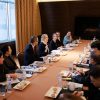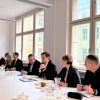This article is an updated version of the material that published on Ukraine verstehen website
I was starting to read the report “Ukraine through the Eyes of Germany”, prepared by German Society for International Cooperation (GIZ), with butterflies in my stomach, bracing myself to find a range of usual stereotypes and propaganda breeding in the German public opinion. However, the reality was different.
The report is based on interviews with 44 Germans who know Ukraine well or relatively well. And this is the first piece of good news – the fact that there are at least 44 people from various professional backgrounds (business, policy analysis, academia, media and more) all over Germany who are informed about Ukraine – in some aspects deeper and better than, I daresay, some Ukrainians themselves. While 44 may not seem a lot, I doubt 44 “Ukraine-aware” people could be found among, say, nationals of Italy or the Netherlands, or even in Germany itself back in the 1990-ies. And while their perceptions may differ from the public opinion at large and should by no means be generalized to the whole German population, the fact that these people are the opinion-shapers in their country is definitely in Ukraine’s favour.
Another piece of good news is that these people’s opinion about Ukraine is generally balanced, even favourable, and almost devoid of myths and stereotypes. The interviewed Germans admire Ukraine’s civil society and Euromaidan Revolution of Dignity (the striking revelation of one of the interviewees goes that Euromaidan was for him the biggest socio-political event after the fall of the Wall that he experienced personally), emphasize the reintegration of internally displaced persons (IDPs) as Ukraine’s success story, have the understanding of peaceful coexistence of Ukrainian and Russian languages in Ukraine, up to the nuanced observations of the changing language dynamics over time, and of Russia’s responsibility for the aggression in the East. While some interviewees do express erroneous convictions – for example, that Russians were banned from travelling to Ukraine – such mistakes are rare.
They do express concerns over the progress of reforms which many Ukrainians could share too – however, some of the interviewees are pointedly affectionate about Ukraine, highlighting its devotion to European values, its importance as a “European project”, expressing strong belief in its economic potential and even praising its corruption fighting efforts (according to one interviewee, “no other country, except Romania, fights corruption as systemically as Ukraine”). Some of the respondents also have the sophisticated understanding of the danger, which a democratic and prosperous Ukraine would pose to the current Russian regime, and hence the reason why the Kremlin is putting every effort in undermining Ukraine’s prosperity.
That said, the report illustrates that typical problems of Ukraine’s image abroad are here to stay. To begin with, the range of key associations with Ukraine remains negative: after 2014“war”, “crisis” and “Crimea” added to the wide-spread association of Ukraine with corruption. According to the nation-wide survey in Germany, commissioned by the team of New Europe Center to TNS pollster in 2015, the range of associations at the public level also included “Russia” and “poverty”, with the only positive association being “Klitschko”. The respondents emphasize the problems which are long known in Ukraine but remain unresolved: lack of interest towards Ukraine beyond crisis situations in the German media and the absence of reporters of key German media in Kyiv. Above all, the appearance of Ukraine on the German mental map, confirmed by the report and starting from Euro-2012 and up to the events of Euromaidan and Russian aggression, speak not so much of the conscious efforts of the Ukrainian state to promote its image abroad, but rather of its situational and occasional nature, which is bound to fade away as long as there are no more crisis-related causes. Making Ukraine consistently interesting and attractive to Germans is still a task for the Ukrainian leadership. Until it is resolved, there are high chances that we will observe more titles like the one under which Handelsblatt published its interview with Ukraine’s President Petro Poroshenko ahead of its visit – “Poroshenko brings Ukrainian economic problems to Germany”.
The report also vividly demonstrates where Ukraine and German opinion-leaders are still on different pages – Ukraine’s NATO integration issue. While Ukraine’s NATO membership aspirations are part of the Ukrainian legislation and the Bucharest NATO summit declaration promises membership to Ukraine, the report reads as if the interviewees predominantly share the opinion that Ukraine shouldn’t join NATO and that NATO should be no means welcome Ukraine’s integration.
The revelations and conclusions of the study are useful not only for understanding the perception of Ukraine in Germany, but also for understanding Germany itself. I personally found it surprising when the metaphor of a bridge between the East and the West, well known in Ukraine, was applied not to Ukraine but … to Germany. German efforts of dialogue facilitation with Russia and between Russia and Ukraine are not treated with understanding in Ukraine, which has its own position and perspective, but this report at least helps comprehend where this German standpoint comes from. On the other hand, the discussion about providing Ukraine with German weapons was equally surprising for me – the report revealed some proponents of this step, contrary to German official policy.
Overall, the report is setting the agenda for Ukraine’s relations with Germany, pinpointing Ukraine’s achievements, failures and gaps in communication. Above all, it also shows who are the monitors of Ukraine in Germany – “friends of Ukraine” as they would probably be called in Ukrainian political jargon – and their presence, still to be reflected upon and strategically engaged with, is probably one of the biggest Ukraine’s advantage in relations with its key partner in Europe. Importantly, working on the expansion of this list is also Ukraine’s strategic task.







